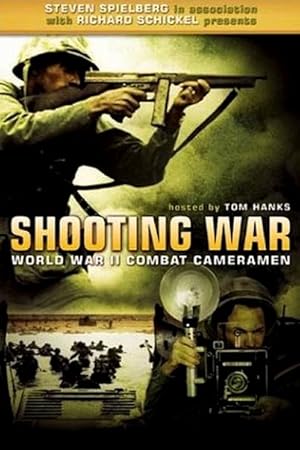
Shooting War Page #2
- Year:
- 2000
- 88 min
- 21 Views
He ran into the whole bunch of 'em.
And 15 or 16 torpedo planes went down.
These men of torpedo squadron eight
found the Japanese carriers.
They scored no hits,
but they distracted enemy gunners,
allowing our dive bombers
to sink four carriers.
Only one man, George Gay,
on the right, survived.
One of Ford's crew shot these pictures.
The director made them into a short
memorial film for the next of kin.
Midway shifted the balance
of naval power in the Pacific.
It cost the Japanese
almost half their carriers.
continued to pose a deadly threat.
October, 1942. The Hornet steams
toward the battle of Santa Cruz
near Guadalcanal.
With the Enterprise, she was soon
fighting off assaults from the air.
How close the combat often was
is demonstrated by this sequence,
shot from the Enterprise.
A near miss shakes the Enterprise.
on the flight deck as the ship fights on.
The camera catches the wild swing of
the huge ship as it takes evasive action.
But still the bombs rained down.
but not the cameraman.
The Hornet did not survive either.
We were listing to the starboard.
Real heavy list.
I went to the fantail
to help with the wounded,
where I stayed until
I swam out about 45 degrees this way.
Got out so far
and here come the destroyers.
I figured, "This is gonna be
a piece of cake. Pick us up real quick."
Then they backed down and took off.
around the ship and firing.
"What are they firing at?"
We looked in the sky.
Coming in was a V formation
of twin-engine bombers.
You could see the five-inch
anti-aircraft bursts up there.
They came in, went right overhead,
and one hit the fantail back here
and the rest was in a pattern
round the stern of the ship.
It continued on and never came back.
I got picked up right after that
by the 411 Anderson.
was a coup de grce.
The Hornet's short,
brave life was ended
when American destroyers sank her.
Our ship had been in commission
for one year and six days.
But the carrier war
We didn't have motors
but you had to hand-crank.
When we did flight-deck operations,
we did not hand-crank at three turns
per second on the small crank.
We used the big crank
and would start going up to high speed
because we wanted
slow motion of the crash.
The pilot coming in for landing.
If you ever see the photographer
start that big crank,
look out, you bought the farm.
The footage taken on the flight decks
forms an eerie ballet of destruction
and of unlikely survival.
By late 1942, we were officially
Translation
Translate and read this script in other languages:
Select another language:
- - Select -
- 简体中文 (Chinese - Simplified)
- 繁體中文 (Chinese - Traditional)
- Español (Spanish)
- Esperanto (Esperanto)
- 日本語 (Japanese)
- Português (Portuguese)
- Deutsch (German)
- العربية (Arabic)
- Français (French)
- Русский (Russian)
- ಕನ್ನಡ (Kannada)
- 한국어 (Korean)
- עברית (Hebrew)
- Gaeilge (Irish)
- Українська (Ukrainian)
- اردو (Urdu)
- Magyar (Hungarian)
- मानक हिन्दी (Hindi)
- Indonesia (Indonesian)
- Italiano (Italian)
- தமிழ் (Tamil)
- Türkçe (Turkish)
- తెలుగు (Telugu)
- ภาษาไทย (Thai)
- Tiếng Việt (Vietnamese)
- Čeština (Czech)
- Polski (Polish)
- Bahasa Indonesia (Indonesian)
- Românește (Romanian)
- Nederlands (Dutch)
- Ελληνικά (Greek)
- Latinum (Latin)
- Svenska (Swedish)
- Dansk (Danish)
- Suomi (Finnish)
- فارسی (Persian)
- ייִדיש (Yiddish)
- հայերեն (Armenian)
- Norsk (Norwegian)
- English (English)
Citation
Use the citation below to add this screenplay to your bibliography:
Style:MLAChicagoAPA
"Shooting War" Scripts.com. STANDS4 LLC, 2024. Web. 26 Apr. 2024. <https://www.scripts.com/script/shooting_war_18036>.


Discuss this script with the community:
Report Comment
We're doing our best to make sure our content is useful, accurate and safe.
If by any chance you spot an inappropriate comment while navigating through our website please use this form to let us know, and we'll take care of it shortly.
Attachment
You need to be logged in to favorite.
Log In